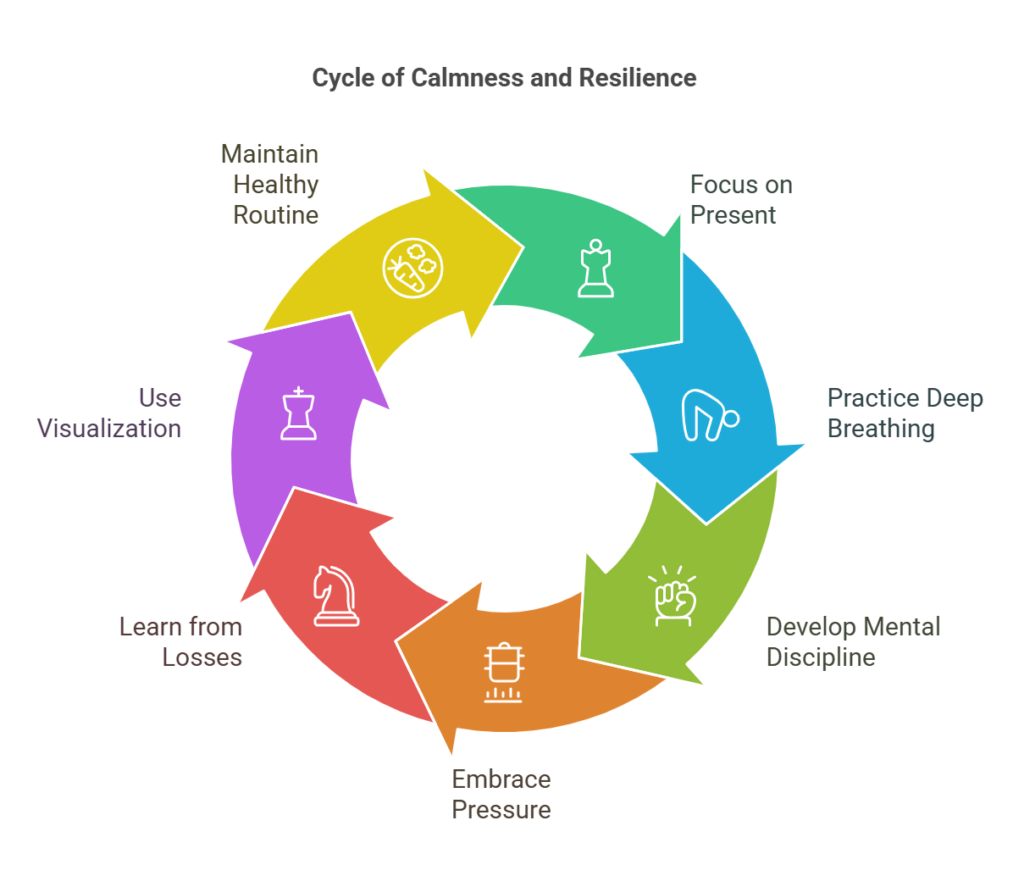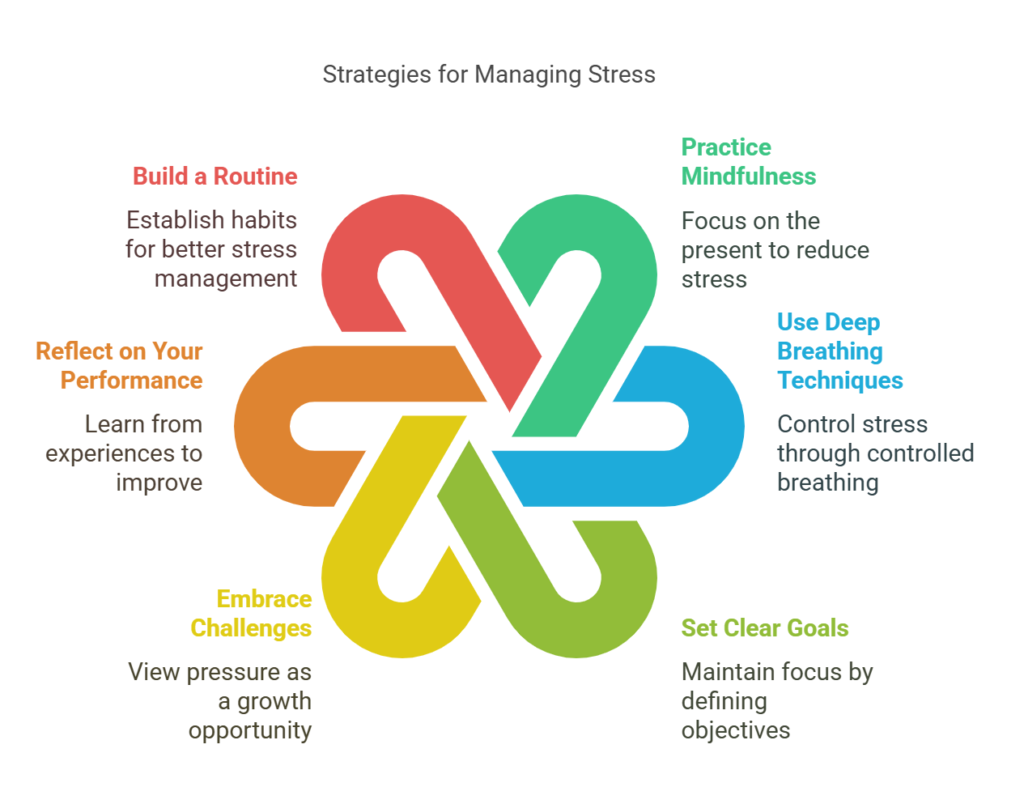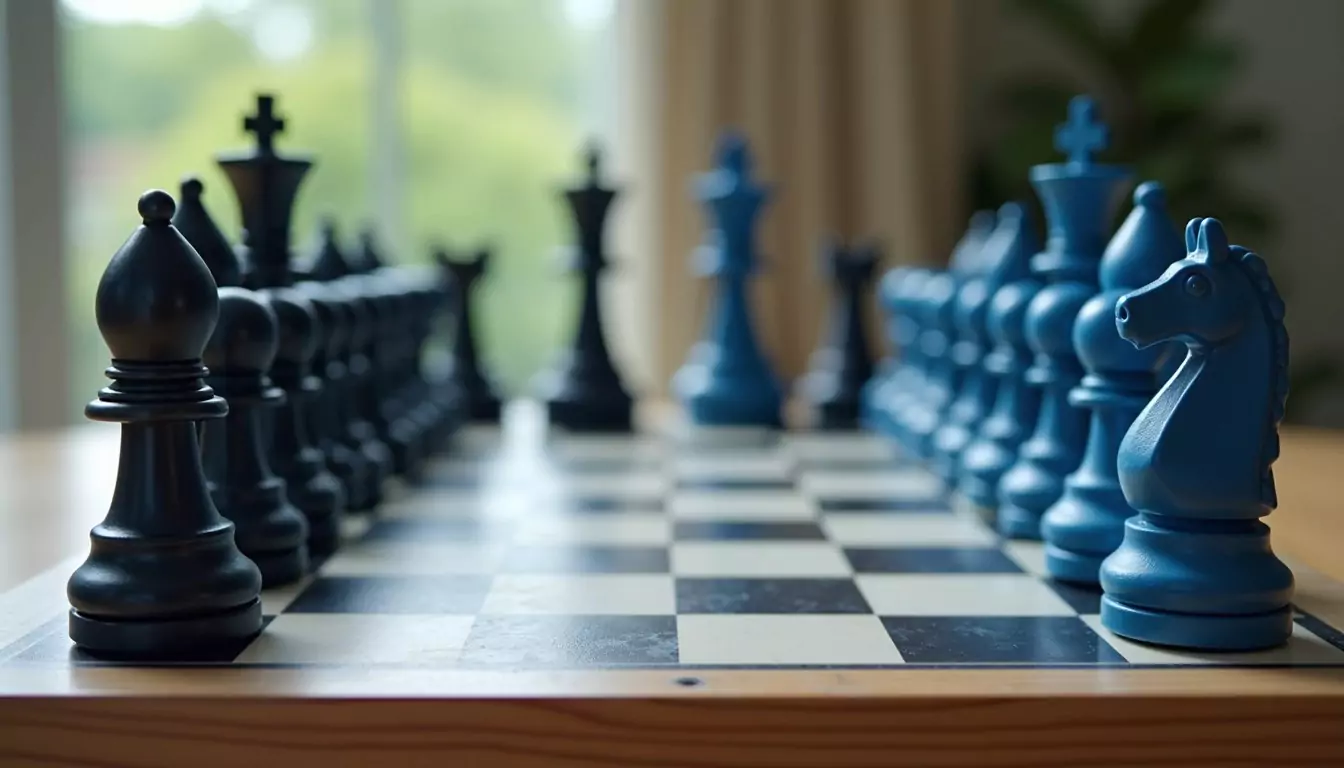Staying calm under pressure is a skill that many seek. High-level chess players show this trait every day. Their calm can make the difference between a win and a loss. In this article, we explore the science behind calmness.
Chess is a game of deep thought and quick decisions. Grandmasters must plan many moves ahead. They face fierce pressure with each move. A recent study of chess champion Gukesh showed that his heart rate stayed low even when he was losing. This calm is not by chance. It is the result of practice and mental control.
Chess grandmasters train hard. They work on their minds and bodies. Their calm is a tool they use during play. It helps them think clearly and act with precision. The lessons they learn can help us all.
What Does It Mean to Stay Calm Under Pressure?
Staying calm means keeping your mind clear. It means not letting stress cloud your thoughts. It also means keeping your body in check. Many studies show that a low heart rate is linked to calmness. When you are calm, you can think and act better.
A calm mind helps you solve problems. It lets you see things clearly. Under stress, the brain can become foggy. Calmness clears the fog. It also helps you make better choices. The science of calm shows that your body and mind work together. When you control your breath and heart rate, you control your stress.
The Science of Calm: How the Body Responds
Research tells us that the body has a way to deal with stress. The fight or flight response is common. This reaction makes the heart beat faster. It also sends a rush of chemicals to the brain. In a calm state, the heart rate is steady. The body stays relaxed and the mind works better.
Studies using heart rate monitors show that calm people have lower heart rates. Chess players, for example, often show low heart rates even during tough moves. This steady heart rate helps them think clearly. The science here is simple: a steady heart leads to a steady mind.
Breathing is key to this process. Deep, slow breaths lower the heart rate. This method is often taught to athletes and leaders alike. By controlling your breath, you can keep stress at bay. The same idea works for chess players and for everyday challenges.
Lessons from Chess Grandmasters
Chess grandmasters have honed the art of calm over many years. Their training shows that calmness is a learned skill. Here are some lessons from the top players:

Focus on the Present Moment
Grandmasters learn to focus on the present. They do not worry about past moves or future outcomes. This focus lets them give full attention to the current move. It also keeps their minds clear. Staying in the moment is a key part of calmness.
Practice Deep Breathing
Many chess players use deep breathing to lower their heart rate. They take slow, deep breaths before and during games. This simple act helps to reset the body. It also brings a sense of calm. Learning this technique can help you in daily stressful situations.
Develop Mental Discipline
Grandmasters train their minds like athletes train their bodies. They use practice and repetition to build mental discipline. This discipline makes it easier to stay calm. It helps them avoid rash decisions. A calm mind leads to better choices on and off the board.
Embrace the Pressure
Pressure is a part of chess. Grandmasters learn to see pressure as a tool. They use it to sharpen their focus. Instead of being overwhelmed, they channel the pressure into clear thinking. This approach can work for you too. Embrace pressure as a chance to grow and improve.
Learn from Losses
Even the best players lose. They study their losses and learn from them. This attitude helps them remain calm when things go wrong. They do not let a loss shake their confidence. Instead, they see it as a lesson. Accepting losses is key to building resilience.
Use Visualization Techniques
Many grandmasters use visualization to prepare for games. They imagine different scenarios in their minds. This method helps them plan moves ahead. It also builds confidence and calm. Visualization is a tool you can use to plan for success under pressure.
Maintain a Healthy Routine
Staying calm also comes from a healthy body. Chess players follow strict routines. They eat well, sleep well, and exercise regularly. A healthy body supports a calm mind. These habits are essential for handling stress in any field.
Real-World Data and Expert Opinions
A study from a top sports institute measured the heart rates of chess grandmasters during games. The data showed that grandmasters maintained a lower heart rate under pressure. Experts say this is a sign of mental control. Dr. Ravi Patel, a sports psychologist, notes that “calmness is a learned skill that can improve performance.” He adds that techniques like deep breathing and visualization are key.
In another study, researchers compared stress levels in chess players and other athletes. They found that chess players who practiced mental discipline had lower stress markers. This evidence shows that staying calm is not just natural talent. It is a skill that can be learned and honed over time.
How to Apply These Lessons in Your Life
You do not need to be a chess grandmaster to learn from these lessons. Here are some practical tips to help you stay calm under pressure:

Practice Mindfulness Daily
Take a few minutes each day to focus on your breath. Sit quietly and watch your thoughts. This practice builds a habit of staying in the moment. Over time, it will help you manage stress better.
Use Deep Breathing Techniques
When you feel stress rising, pause and take deep breaths. Inhale slowly through your nose and exhale through your mouth. Repeat a few times. This simple exercise can lower your heart rate and calm your mind.
Set Clear Goals
In high-pressure situations, know what you want to achieve. Clear goals help focus your mind. They prevent you from getting lost in worries. Write down your goals before meetings or tasks. A clear mind is a calm mind.
Embrace Challenges
See pressure as a chance to learn and grow. When challenges arise, treat them as opportunities. This shift in perspective can reduce stress. It also builds mental strength and resilience.
Reflect on Your Performance
After a stressful event, take a moment to reflect. Write down what went well and what you can improve. This habit builds self-awareness. It helps you see that stress can be managed. Reflection turns mistakes into lessons.
Build a Routine
A healthy routine supports mental calm. Ensure you get enough sleep, eat well, and exercise. A good routine makes it easier to handle pressure. When your body is strong, your mind can stay clear.
Use Visualization
Imagine yourself handling a tough situation with calm and clarity. Picture each step in your mind. This practice prepares you for real challenges. Visualization builds confidence and reduces anxiety.
Seek Feedback and Learn
Ask for feedback after stressful events. Learn what worked and what did not. Use this advice to improve your approach. Growth comes from learning, not from avoiding mistakes.
Benefits of Staying Calm Under Pressure
There are many benefits to staying calm. A calm mind leads to better decisions. It helps you solve problems quickly. You can see solutions that stress might hide. In teams, calm leaders inspire trust. They build strong bonds and create a positive work environment.
Staying calm also boosts your health. Lower stress levels mean a healthier heart and mind. It reduces the risk of many stress-related illnesses. Calmness can improve sleep, mood, and overall well-being. The science is clear: a calm mind leads to a better life.
Moreover, a calm leader sets a strong example. Your calm behavior can influence those around you. It creates a ripple effect of clear thinking and steady action. Teams that work with calm leaders are more resilient and effective. This benefit extends to both work and personal life.
How to Measure Your Calmness
You can track your progress in staying calm. Use a heart rate monitor during stressful tasks. Note if your heart rate drops with deep breathing. Keeping a journal can help too. Write down moments when you felt calm and when you did not. Over time, you will see patterns. This data can guide you to better stress management.
You may also use simple apps that track your mood. These tools can show how well you handle pressure. Data and self-reflection work well together. They help you see the benefits of calm behavior. As you improve, your stress will lessen and your performance will rise.
Final Thoughts: The Power of Calm Leadership
Staying calm under pressure is a skill you can learn. Chess grandmasters show us that calm can lead to great success. Their habits, like deep breathing and mindfulness, work well. You can adopt these habits in your own life. By practicing and reflecting, you can build a calmer mind.
A calm leader makes better decisions. They inspire trust and boost team spirit. The science of calm is clear: lower stress means a better life. Use the tips in this article to strengthen your calm. Embrace routines that support mindfulness and focus. Over time, you will see real benefits.
By learning to stay calm, you gain a key edge in life. Your ability to manage stress will help you solve problems and grow. Trust in the science and learn from the masters. The path to a calmer, more effective leadership style is clear. Take the steps today and watch your success grow.
Below are the research articles and study links:
- Heart Rate Variability and Cognitive Performance
Study on how a steady heart rate supports clear thinking under pressure.
Read the study on Heart Rate Variability and Performance
(Note: This article examines how physiological markers, like heart rate variability, correlate with performance in high-pressure tasks.) - Comparative Analysis of Stress Markers in Elite Athletes
Research comparing stress responses in different competitive fields, including strategic sports like chess.
Access the Comparative Study on Stress Markers & Another Study by Researchgate here
(This study provides insights into how mental discipline and physical responses are interlinked across various competitive domains.) - Deep Breathing Techniques and Stress Reduction
An investigation into how controlled breathing exercises can lower heart rate and mitigate stress.
Explore the Deep Breathing and Stress Management Study
(This article reviews the science behind deep, slow breathing and its effectiveness in promoting a calm state.) - Visualization Strategies in High-Pressure Situations
A look at how mental imagery and visualization techniques enhance focus and performance under pressure.
Learn About Visualization Techniques in Competitive Settings
(The research outlines methods used by athletes and performers to prepare mentally for challenging scenarios.) - Mindfulness Training and Its Impact on Stress Reactivity
Research on how mindfulness practices contribute to lower stress levels and improved decision-making.
Discover the Effects of Mindfulness on Stress Reduction
(This study discusses the benefits of mindfulness and meditation in managing stress and enhancing mental clarity.)







